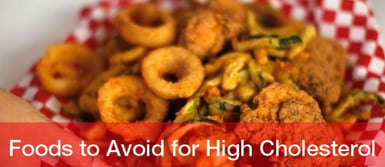 A healthful diet is one way to help keep cholesterol levels in check. While avoiding foods with high cholesterol content may be beneficial for some, the most effective dietary approach to cutting blood cholesterol is choosing foods that contain unsaturated fats over those that contain saturated or trans fats.
A healthful diet is one way to help keep cholesterol levels in check. While avoiding foods with high cholesterol content may be beneficial for some, the most effective dietary approach to cutting blood cholesterol is choosing foods that contain unsaturated fats over those that contain saturated or trans fats.Cholesterol is classified into two groups, based on the type of protein that transports it through the bloodstream:
- LDL cholesterol, which is cholesterol carried by low-density lipoproteins, is dropped off for use throughout the body. Because this kind of cholesterol is prone to building up, it is often referred to as bad cholesterol.
- HDL cholesterol, which is cholesterol carried by high-density lipoproteins, works together with its protein counterpart like a garbage truck, collecting extra bad cholesterol from the arteries and bringing it back to the liver to be disposed of. For this reason, it's referred to as good cholesterol.
Types of Fat
The goal is to eat a diet that promotes low levels of bad cholesterol and high levels of good cholesterol. Fat intake affects this balance because fatty acids bind to liver cells and regulate the production of cholesterol.
Each form of fat influences cholesterol levels differently so it is important to pay attention to the types of fat consumed:
- Saturated fats, which are found mostly in meats and dairy products, signal the liver to produce more bad cholesterol.
- Unsaturated fats, found mostly in fish, and plants, such as nuts, seeds, beans, and vegetable oils, can help increase the rate at which the liver reabsorbs and breaks down bad cholesterol.
- Trans fats are solidified vegetable oils, and are usually made through an artificial process called hydrogenation. They are often found in fried, bakery and packaged foods. They not only lead to increased bad cholesterol levels, but also lower levels of good cholesterol. For this reason, they are considered the unhealthiest fats of all. As a result, trans fats should not just be reduced but cut out completely from your diet. (In 2013, the United States Food and Drug Administration (FDA) announced that the major commercial source of trans fats, partially hydrogenated oils, were no longer "generally recognized as safe" because of their strong links to coronary heart disease. A national ban on trans fats will begin to be implemented in 2018, and several American cities have already banned them from use in restaurants.)
The American Heart Association advises reducing saturated fat intake to no more than 5 to 6 percent of the total daily calories. To do this, they suggest limiting the following foods:
- fatty beef
- lamb
- pork
- poultry with skin
- lard and shortening
- dairy products made from whole or reduced-fat milk
- saturated vegetable oils, such as coconut oil, palm oil, and palm kernel oil
It is also important to avoid trans fats. Foods to stay away from include:
- packaged cookies, cakes, doughnuts, and pastries
- potato chips and crackers
- packaged frosting
- commercially fried foods
- bakery goods that contain shortening
- buttered popcorn
- any products that contain partially hydrogenated or hydrogenated vegetable oils
Only animal products contain cholesterol, as a liver is needed for its production. However, cholesterol content is not as much of a concern as fat content.
Cholesterol that has been swallowed is poorly absorbed into the bloodstream and has little effect on cholesterol levels after several hours. Some of this cholesterol, however, may be absorbed and reach the arteries, so limiting high-cholesterol foods may be beneficial.
Foods that contain cholesterol and may be best avoided include:
- red meat
- sausage
- bacon
- organ meats, such as kidney and live
Please leave questions or comments below.
